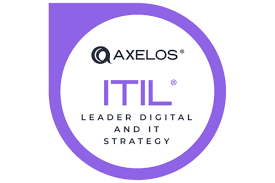ITIL® 4 Leader: Digital and IT Strategy

About Course
The ITIL® 4 Digital and IT Strategy course is a critical component of the ITIL 4 Strategic Leader certification, aimed at equipping IT and digital leaders with the skills to craft and execute an effective IT and digital strategy that aligns with the wider business goals. This course delves into the essentials of Digital Transformation, the development of digital and IT strategies, and the management of innovation and emerging technologies.Learners will explore various modules covering key concepts such as Digital Transformation, competitive advantage, ITIL® practices, vision for digital organizations, strategic planning, and measuring the effectiveness of strategy implementation. With a blend of strategic approaches, the ITIL strategic leader training prepares individuals to lead with agility and confidence in a dynamic digital environment.Upon completion of the course, participants will be able to manage risks, foster innovation, and drive continual improvement to maintain long-term organizational viability. This training is crucial for those looking to attain the esteemed ITIL 4 Strategic Leader certification and excel in digital and IT strategy roles.